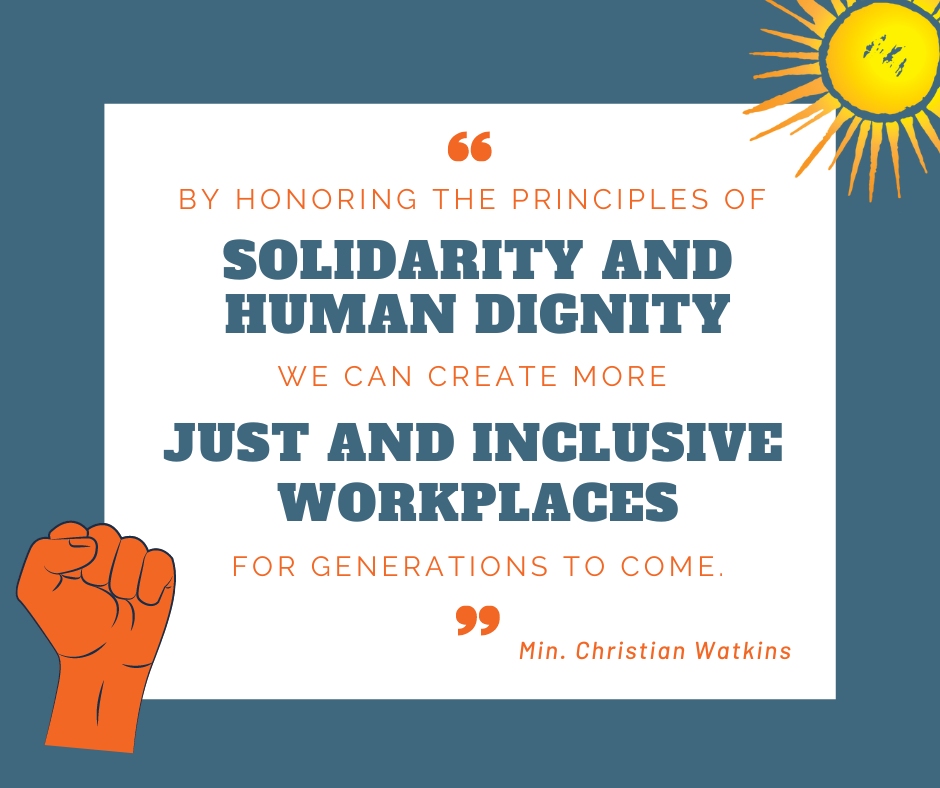
FAMILY-FRIENDLY WORKPLACE POLICIES
Increasing women’s economic opportunity results in progress for all. Federal workplace policies, therefore, should encompass the needs of women and families.
Our Position
Catholic Social Justice teaches that our policies, particularly in the workplace, must respect the needs of every human person in community with one another. Family life is an important place for personal growth and should be protected from the stress of poverty and threat of losing wages or a job. Instead, the family, in all forms, can teach society how to better care for its members.
In most families, women, particularly women of color, bear the brunt of caretaking responsibilities. Additionally, women are the primary or sole breadwinner in 4 out of 10 households with children under 18. Women and children are disproportionately affected by poverty; nearly one in eight women – over 15.5 million – and nearly one in six children – nearly 11.9 million – lived in poverty in 2018.1 We need policies that reverse these trends and support women and families with children.
Work is important for the life of individuals and society, but work must enrich life, not dominate it. Providing family-friendly workplace protections is necessary to build an economy that puts people, not profit, at the center. NETWORK is committed to promoting families’ economic stability by creating an environment where all workers can afford to balance work and family responsibilities.
NETWORK Advocates for Federal Policies That:
Guarantee paid family and medical leave and paid sick days for all workers
Balancing the responsibilities of work and family are challenging, particularly during times of illness, family growth, or personal crisis. When a worker or their loved one has a serious health condition, they need time to recover or serve as a caretaker. In the joyful time of growing a family through pregnancy or adoption, time away from work to care for the child is necessary. Today, only 13% of workers in the U.S. have paid family leave through their employers, and fewer than 40% have access to personal medical leave through employer-provided short-term disability insurance.2
34.2 million people in the U.S. do not have a single paid sick day.3 When workers are sick, they often must work despite putting themselves and others at risk. Similarly, when sick children need to stay home from school or childcare, parents without paid sick days cannot stay home to care for their child without risking wage or job loss. Even with access to unpaid sick days, for low-wage workers, the lost wages may be too burdensome to take the proper time off to care for an illness, receive counseling, or pursue justice after leaving an abusive relationship or experiencing sexual harassment or assault.
Paid leave allows families to address both health and family needs without risking economic security. While some states have passed paid family and medical leave legislation, it is time to level the playing field and ensure all workers across the country have access to paid family leave and paid sick days.
Ensure workplace safety and suitable accommodations for pregnant workers.
Despite existing protections, pregnant workers in the United States still face workplace discrimination in all industries, across race and ethnicity, and in every state. Too often, pregnant workers are forced out of their jobs and denied small accommodations – such as sitting instead of standing or carrying a water bottle – that would enable them to continue working and supporting their families. Women of color and immigrants are at particular risk. Latina women, Black women and immigrant women more frequently hold inflexible and physically demanding jobs with additional challenges for pregnant workers, such as home health aides, food service workers, package handlers, and cleaners.
We need legislation that requires employers to provide reasonable accommodations for limitations arising out of pregnancy, childbirth, or related medical conditions, allows pregnant workers to request such accommodations without fear of punishment, and encourages collaboration between pregnant workers, their doctors, and employers to determine a just and equitable course of action.
Encourage flexible schedules for employees and make child care accessible.
Inflexible and unpredictable job schedules challenge workers’ ability to balance work and family. Almost 30% of employees work jobs with varied start and stop times and nearly 70% of low income workers cannot change their scheduled start or stop time if needed.4 On top of that, the cost of quality child care is rising. Balancing the daily needs of family and work is difficult in these situations, particularly when a family does not have a full-time stay-at-home caregiver. Predictable scheduling with the option for flexibility allows parents to balance their caregiving and work responsibilities.

















